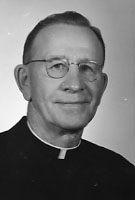
Father Bernard F. Meyer, MM
Born: February 16, 1891
Ordained: December 2, 1916
Died: May 8, 1975
Father Bernard Francis Meyer died at Phelps Memorial Hospital, North Tarrytown, New York at 7:00 a.m., May 8, 1975, the Feast of the Ascension.
Father Meyer was born in Brooklyn, Iowa, February 16 1891, but the family later moved to Stuart, Iowa. Graduated from the local high school in 1907, he worked on the family farm and entered St. Ambrose College, Davenport, Iowa, in 1910 to study for the diocesan priesthood. Beginning, studies at St. Mary’s Seminary, Baltimore in 1913 for the Diocese of Des Moines, he soon heard of Maryknoll. He wrote James A. Walsh on the Feast of the Ascension in 1914, “to send some information regarding the Chinese missions and the requirements for a missionary.” I am inclined to believe, he added, “that our good Lord wants me to enter the ‘field afar’.”
As a deacon he was named procurator of the Seminary and member of the first Maryknoll Council. Father Meyer was ordained a priest by Bishop Dowling of Des Moines on December 2, 1916. In 1917 he was appointed to the Venard faculty. In 1918 he became one of the pioneer Departure group to open Maryknoll’s first mission in Kongmoon, South China. Five years later Pere Robert in a letter of March 8, 1923 wrote to Father James A. Walsh: “In my opinion it would be a mistake to recall now, Father Meyer. He is doing splendid work and he is presently one of the most successful missionaries in China, an example to be given to all, for his zeal, devotion and work.”
Named a delegate to the first General Chapter in 1929, at Maryknoll, Father Meyer soon returned to Wuchow, “the city of no conversions, where he had pioneered in a very difficult mission area. He was named superior of this new mission in 1931 and appointed its Prefect Apostolic when it became a Prefecture. Ill health forced him back to the United States, but he went back to China as a delegate from Wuchow to the Second General Chapter held in Hong Kong in 1936. Health problems found him residing at Hong Kong at the time of Pearl Harbor. He was interned by the Japanese and when offered repatriation chose instead to remain to care for the medical and spiritual needs of his fellow prisoners. At the end of the war, he helped to establish the Catholic Center in Hong Kong. He again returned to the U. S. as a delegate to the Third General Chapter in 1946. Returning to work in the Canton area, he was finally forced to leave China by the Communists in 1950. Although elected as a U. S. delegate, he was unable to attend the 1956 General Chapter due to his poor health.
An invitation to promote Catholic Action in the Diocese of Raleigh, North Carolina, from Bishop Vincent Waters resulted not only in spiritual good for the area but a cure for the acute rheumatism that afflicted Father Meyer. This apostolate in the South also marked the beginning of a series of publications related to the Christian Family Life Movement where Father Meyer applied his missionary background and methods. Of nearly a dozen publications, his Lend Me Your Hands (1955) and The Whole World Is My Neighbor (1962) were the most popular. Even in his last months he was preparing another manuscript, which it is still hoped to publish.
The final decade of Father Meyer’s life was marked by declining health, but with no loss of interest and zeal for anything directly or indirectly related to the cause of the missions in their broadest concept. He was a man of abundant ideas with a vigorous mind until the very end of his almost six decades of life in Maryknoll. Father Meyer took up residence at St. Teresa’s when the facility was opened in 1968.
The Vigil Service for Father Meyer was held at St. Teresa’s Residence on Sunday, May 11, at 7:30 p.m. Mass of the Resurrection was concelebrated Monday, May 12 at 11:30 a. m. in the Maryknoll Chapel, with Bishop John W. Comber as the principal celebrant; Father Thomas V. Kiernan as the homilist; and Bishop James E. Walsh, Father Meyer’s classmate and sharer of departure date for the foreign missions, giving the final absolution.
